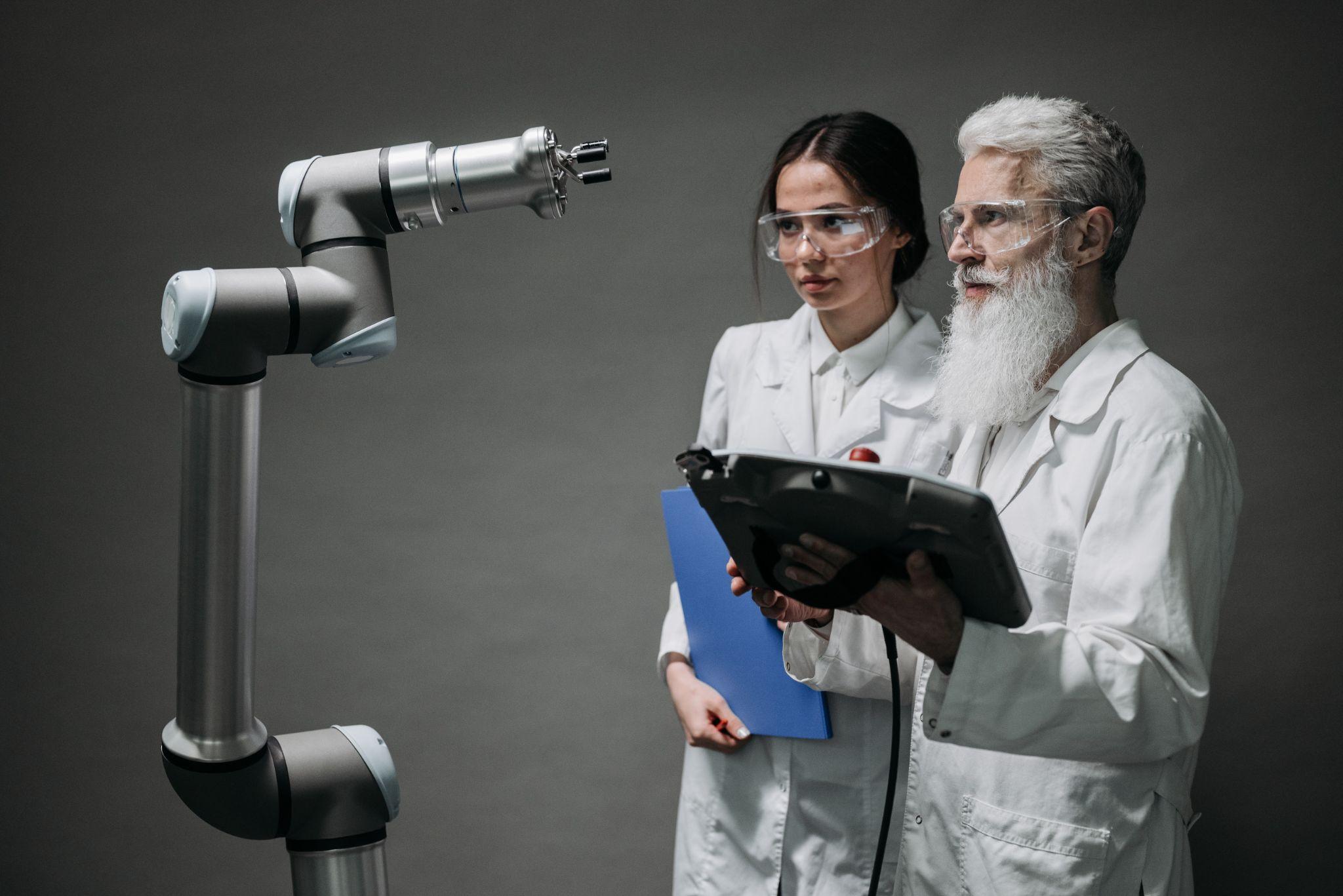Revolutionizing Healthcare with AI: Applications, Challenges, and Opportunities

Table of content
Applications of AI in Healthcare
Future of AI in Healthcare
Applying AI in Healthcare
Challenges of AI in Healthcare
Solutions to Overcome the Challenges
Benefits of AI in Healthcare
Conclusion
Artificial intelligence (AI) has been making notable strides in the healthcare industry, and its influence continues to grow. AI represents a type of advanced computer technology designed to mimic human learning and reasoning, allowing it to perform tasks that traditionally require human intelligence. In healthcare, AI is applied in various fields, ranging from disease diagnosis to the development of innovative treatments.
The impact of AI on healthcare is profound. Healthcare professionals are always searching for ways to enhance patient outcomes, lower operational costs, and boost efficiency. AI presents solutions to these challenges by offering more precise diagnoses, predicting patient outcomes with greater accuracy, and optimizing treatment plans. In this blog, we’ll delve into the current and potential applications of AI in healthcare, as well as the hurdles that need to be addressed to unlock its full potential.
While it’s now common knowledge that artificial intelligence is part of our everyday lives, there’s still a long road ahead in terms of its integration into healthcare. Concerns around ethics, privacy, and job security persist, as people worry about the potential for AI to replace human roles. However, there are already some remarkable advancements being made. For example, PathAI has introduced machine and deep learning algorithms that assist pathologists in diagnosing cancer with improved accuracy. This is a significant achievement, yet the healthcare sector still faces considerable technical and cultural challenges in embracing AI. Before we explore those obstacles, let’s take a closer look at the ways AI is already benefiting healthcare.
Applications of AI in Healthcare
Machine Learning in Healthcare
Machine learning, a core element of AI, is transforming healthcare by improving both diagnosis and treatment. By processing vast amounts of clinical data, machine learning algorithms can identify patterns and predict medical outcomes with precision. This helps healthcare professionals analyze patient records, medical images, and even discover new therapies, leading to better treatments at reduced costs. Machine learning allows for precise disease diagnoses, personalized treatments, and early detection of subtle changes in vital signs. Precision medicine, a widely used application, leverages patient-specific data to recommend the most effective treatments. As deep learning advances, its role in healthcare, especially in speech recognition and clinical decision-making, will continue to grow.
Natural Language Processing in Healthcare
Natural language processing (NLP) is revolutionizing healthcare by enabling computers to understand and analyze human language. This technology is applied in various ways, including diagnosing diseases from medical records, predicting potential health risks, and recommending treatments. NLP allows healthcare professionals to manage large volumes of complex data quickly and accurately. It’s becoming an indispensable tool for improving diagnoses and offering personalized patient care.
Rule-Based Expert Systems
In the 1980s, rule-based expert systems were widely used in healthcare for clinical decision support. These systems, based on ‘if-then’ rules, are still in use today, especially in electronic health record (EHR) systems. However, as the number of rules grows, they can become conflicting and harder to manage, especially when updates are needed due to changes in the healthcare landscape.
Diagnosis and Treatment Applications
AI has long been used in healthcare to assist with diagnosis and treatment. While early rule-based systems had potential, they didn’t fully integrate with clinician workflows. Today, integrating AI for diagnosis and treatment into healthcare systems remains a challenge. Many AI tools for diagnosis and clinical trials operate as standalone systems, requiring extensive integration efforts to work with existing EHR systems.
Administrative Applications
AI is also streamlining healthcare’s administrative processes. By automating tasks like data entry, claims processing, and appointment scheduling, AI frees up time for healthcare professionals to focus on patient care. It also reduces human error and speeds up processes like reviewing health records and test results. AI’s impact on healthcare administration allows medical professionals to deliver better care while maintaining efficiency and cost-effectiveness.
Future of AI in Healthcare
AI in Genomics
AI has the ability to analyze genetic data, helping to pinpoint disease risks and formulate personalized treatment plans. By processing massive amounts of genetic information, AI can also aid in discovering new drug targets, offering hope for previously untreatable diseases.
AI in Remote Patient Care
As telemedicine grows, AI can play a key role in remotely monitoring patients and delivering personalized care. This is particularly beneficial for individuals living in remote or underserved areas who might not have easy access to healthcare professionals.
AI in Personalized Nutrition
By examining a patient’s diet and lifestyle, AI can create tailored nutrition plans aimed at preventing and managing chronic conditions like obesity and type 2 diabetes. This personalized approach can offer more effective solutions for long-term health management.
AI in Mental Health
AI technology can be utilized to track patient behavior and mental health patterns, helping to predict and even prevent mental health crises. This can be invaluable for people dealing with conditions like depression or anxiety, offering early interventions and better care.
Applying AI in Healthcare
The Growing Role of AI in Healthcare
There’s no denying it—AI is set to revolutionize the healthcare industry. According to Acumen Research and Consulting, the global AI market in healthcare is projected to reach $8 billion by 2026. Major tech companies like IBM, Oracle, and AMD are already offering specialized AI solutions tailored to healthcare needs. While the potential applications are vast, let’s explore a few key areas where AI is making a notable impact.
Monitoring In-Patient Mobility
Healthcare professionals, especially in critical units like the ICU, often juggle multiple patients with severe conditions. Monitoring patient movement is crucial, as reduced mobility during prolonged treatments can significantly affect recovery. At Stanford University and Intermountain LDS Hospital, researchers installed depth sensors in patient rooms equipped with machine learning algorithms to track their movements. These sensors were able to accurately detect movement 87% of the time, helping medical staff stay informed about patient conditions in real-time. The goal is to eventually alert ICU nurses when patients need immediate attention, improving outcomes.
AI in Clinical Trials for Drug Development
Developing a new drug is a long, complex, and expensive process. According to Trends in Pharmacological Sciences, it can take up to 15 years and cost between $1.5 to $2 billion to bring a drug to market. About half of this time is spent conducting clinical trials, which are often prone to failure. AI has the potential to change this by helping researchers select the right candidates for trials and monitor their health responses more accurately. This approach not only saves time and money but also increases the likelihood of a successful trial.
Enhancing the Quality of Electronic Health Records (EHR)
Ask any healthcare provider, and they’ll likely tell you that electronic health records (EHR) systems can be a source of frustration. Traditionally, doctors would manually input patient information, often after consultations, which led to inconsistencies and human error. AI-driven speech recognition technology now offers a solution, allowing for real-time documentation of patient interactions, diagnoses, and treatment plans. This results in more accurate records and smoother workflows for clinicians.
Challenges of AI in Healthcare
1. Data Privacy and Security:
Healthcare data is extremely sensitive, and maintaining patient privacy is critical. The integration of AI introduces potential risks where this sensitive information could be mishandled or exposed, leading to privacy violations. Ensuring robust protection of healthcare data is a key concern.
2. Regulatory Obstacles:
AI development in healthcare falls under regulatory scrutiny, yet there are no universally accepted regulations in place. This lack of standardized guidelines creates difficulties for healthcare providers and companies seeking to implement AI technologies, as they must navigate a complex and uncertain legal environment.
3. Ethical Issues:
AI’s role in healthcare raises several ethical questions, such as the potential for bias within algorithms, the impact on healthcare jobs, and whether AI could replace critical human decision-making. These concerns must be carefully considered to ensure AI is used responsibly in medical settings.
4. Resistance to Change:
Both healthcare professionals and patients may resist the integration of AI, fearing it might disrupt traditional healthcare practices or threaten jobs in the sector. Overcoming this resistance is essential for widespread AI adoption.
Solutions to Overcome the Challenges
While AI adoption in healthcare faces considerable hurdles, several measures can be taken to address these challenges effectively. Here are some strategies:
1. Establishing Regulatory Guidelines:
Creating standardized regulations and clear guidelines for AI’s role in healthcare will help ensure that ethical and safe practices are followed. This framework will provide clarity and confidence for those developing and using AI technologies.
2. Building Patient Trust:
To foster acceptance, healthcare providers and companies should be transparent about how AI is being applied and its potential benefits. Building patient trust through open communication is essential for AI to be embraced in healthcare.
3. Tackling Ethical Concerns:
Developers and researchers must actively work to prevent bias in AI algorithms by using diverse data sets and monitoring the impact on healthcare employment. Ensuring that AI is implemented ethically and impartially will help mitigate concerns about its effects on the industry.
4. Promoting Education and Awareness:
Increasing knowledge and awareness about the benefits and safe usage of AI in healthcare is crucial. Healthcare providers and companies should focus on educating stakeholders on how AI can enhance patient care and streamline medical processes.
Benefits of AI in Healthcare
As healthcare organizations adopt AI and machine learning to manage vast amounts of data, the advantages go far beyond just data processing.
1. Improved Diagnostic Accuracy
AI helps healthcare professionals analyze large datasets of medical records, images, and tests, leading to more accurate diagnoses and faster detection of diseases. This results in better treatment outcomes and preventative care.
2. Personalized Treatment Plans
AI leverages patient data, including history and genetics, to develop individualized treatment plans. This level of personalization improves patient care and satisfaction by offering more tailored solutions based on each patient’s unique profile.
3. Streamlining Administrative Tasks
AI in hospital management automates routine tasks such as scheduling, record management, and billing. This reduces errors, lightens the administrative workload, and frees up more time for healthcare professionals to focus on patients.
4. Cost Reduction with Predictive Analytics
AI minimizes costs by optimizing healthcare processes, reducing medical errors, and promoting preventive care. Remote care models, powered by telehealth apps, allow institutions to serve more patients with fewer resources.
5. Supporting Medical Diagnosis and Treatment
AI enhances the ability to diagnose diseases and recommend treatment plans. For example, IBM’s Watson for Oncology uses AI to suggest personalized cancer treatments by analyzing patient data and medical literature.
6. Efficient Patient Data Processing
AI tools like Google’s DeepMind Health help clinicians manage patient data, improving accuracy and reducing false positives in diagnostics. This technology helps predict which patients are at risk and allows for early intervention.
8. Electronic Health Record (EHR) Management
AI-driven analysis of EHRs identifies high-risk patients and provides personalized prevention strategies, improving healthcare outcomes and streamlining workflows for medical professionals.
9. Remote Patient Monitoring
AI facilitates remote patient monitoring by providing real-time health data to doctors, leading to early interventions and reduced hospital admissions. Platforms like Philips’ HealthSuite use AI to monitor patients’ vital signs remotely.
10. Virtual Assistants and Chatbots
AI-powered chatbots and virtual assistants provide medical advice, schedule appointments, and offer symptom checks. These tools help patients access information quickly, improving care efficiency.
Conclusion
Artificial Intelligence (AI) is rapidly transforming the healthcare industry, offering groundbreaking solutions that improve diagnostic accuracy, streamline administrative processes, and personalize patient care. While there are challenges, including data privacy concerns, regulatory issues, and ethical considerations, the potential benefits of AI in healthcare are undeniable. From enhanced treatment plans to remote patient monitoring, AI is already reshaping the way healthcare providers deliver care. As AI technology continues to advance, the healthcare sector will witness even greater innovations, improving outcomes for patients and making medical processes more efficient.
To learn more about how AI is revolutionizing healthcare, visit PangaeaX
Get your data results fast and accelerate your business performance with the insights you need today.



